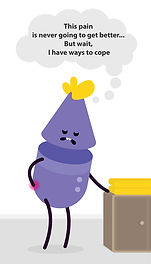
Negative Thinking
Negative thoughts: we've all had them. They're perfectly normal! But, when constant negative thoughts start to make us constantly worried and stressed, we need to see if we can do something about it.
Some call the swirl of negative thoughts "boiling the ocean", "imagining the worst", "getting caught up in negative thoughts", or "worst-case scenario thinking."
Prefer audio?
Listen to the audio here.
Summary: What do I need to know?
-
Your thoughts affect how your pain feels.
-
Negative thoughts are completely normal... but they aren't always helpful!
-
Focusing more on negative thoughts = more pain.
-
Learning to reflect on your thoughts and change your negative thoughts can help improve your pain.
What really is Negative Thinking?
Negative Thinking refers to those very negative thoughts about our pain - those unhelpful thoughts often make you feel helpless and really afraid of the future. It’s common to think this way, especially when you're having severe pain.
Frequent negative thoughts can affect your pain.
Thinking this way all the time, or fairly often can actually make your pain worse, especially over time.
So, the more you have unhelpful, negative thoughts, the worse the pain is, and the worse the pain is… the more you probably have these thoughts… it goes round and round.

Try to identify some of your negative thoughts.
As you read this text, think about the thoughts you have about your pain and how often you have them.
For example:
Are you worried that your pain will never stop? Or are you worried your pain will continue to get worse? Are you worried that your pain may never get better?
These thoughts about your pain aren’t always very helpful. However, they’re incredibly common!! Most people who have pain find themselves “catastrophizing” at one point or another about how the pain feels. Having a cancer diagnosis can trigger negative thoughts too. Engaging in negative thoughts frequently and focusing on them too much can have a lot of negative consequences.
Negative thinking can affect your body.
Negative thinking can affect your body because it leads to increases in the stress reaction. It can be like pouring gasoline on the fire of your pain. If you’re worried that your pain will never get better? Or if it will ever go away? You’ll usually start to feel afraid. Feeling afraid will lead to increased stress reactions in the body, and therefore more pain.
Let’s dig a little deeper.
All of this is not to say that your thoughts cause your pain or can cure your pain. We know that pain is… well, painful. But often the experience of your pain can be worsened by negative thoughts. And the more we focus on these thoughts, the worse the pain feels.
The way you think impacts the way you feel. Your thoughts and emotions, or your “head space”, impact the way you act. Specifically, negative thoughts often make us focus A LOT on our pain.

How to manage negative, unhelpful thoughts

Research consistently shows that having more negative thoughts relates to more pain, more distress, and more disability.
Since using this app, you’ve probably started to learn that reporting your pain can bring attention to different aspects of your life that relate to your pain. Maybe you’ve noticed that on days where you’re happy or distracted, your pain is doing better, or maybe you’ve noticed that on days where you’re struggling or stressed out, your pain is doing worse.
This can usually go both ways – sometimes your pain is worse and that can bring up some difficult emotions later in the day, or some days your state of mind might be in a better place, and so your pain is better. Some days you feel emotionally well and notice you tolerate your pain better.
Doctors and researchers know that your pain affects how you feel emotionally and how you feel emotionally affects your pain too.
Thoughts about pain and pain-related stressors, including cancer, can also make a huge difference in how you adjust and cope with your chronic pain.
Things to remember

1
Identifying negative thoughts can be tough! It's a skill that takes time to develop.
2
When you notice that you're having many negative thoughts, you can try to redirect or change them.
3
Methods for coping with negative thoughts include distraction, listening to relaxation exercises, and calling a friend.
4
Negative thinking can also disrupt your sleep. It's common for your mind to race before bed, which can make it difficult to sleep and lead to more pain. Learning to identify negative thoughts can also help your sleep!
5
Noticing when you're having many negative thoughts is one tool related to your thinking styles. We'll also review other types of thinking that may be causing you distress!
© Desiree R. Azizoddin, Board of Regents of University of Oklahoma, 2022.

